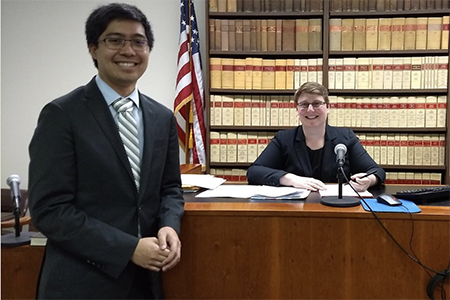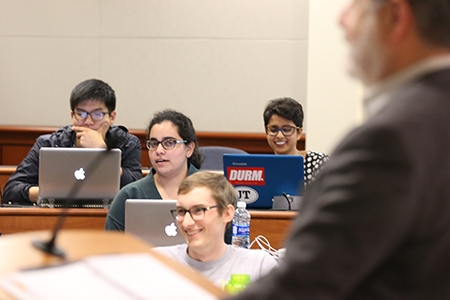Health Law and Policy
Health care is a highly regulated and continually changing industry that engages many law and policy disciplines, from tax, benefits, and employment law to intellectual property, bioethics, privacy, and family law.
Duke Law School is home to a cohort of highly innovative scholars and researchers in the areas of health care law and policy. All work across disciplines with other health care experts at Duke University, including at the Fuqua School of Business, Sanford School of Public Policy, and School of Medicine. Students can select from an array of courses on health law, regulation, and policy, get practical experience addressing the legal needs of clients living with cancer or HIV and AIDS, as well as on matters of HIV/AIDS policy, through the Health Justice Clinic, or assist patients with advanced care planning, such as preparing power of attorney forms and advanced directives, through the Health Care Planning Project (formerly the Cancer Pro Bono Project).

Michael D. Frakes
A. Kenneth Pye Professor of Law and Professor of Economics
Professor Michael Frakes’ empirical research in health law is largely focused on understanding how certain legal and financial incentives affect the decisions of physicians and other health care providers but also examines the ways in which innovation policy can drive up health care costs. According to Frakes, investing just $20 million to give examiners at the U.S. Patent and Trademark Office more time to review applications for secondary patents on pharmaceuticals would reduce the number of invalid patents they approve, saving some $32 million in avoided litigation expenses and leading to several billion dollars per year in cost savings from the accelerated entry of generics.
More Faculty
321 The Law and Policy of Innovation: the Life Sciences
This course analyzes the legal and policy regimes that shape the introduction of new products, processes, and services in the life science industries. Innovation in biopharmaceuticals, medical devices, health services, and health care delivery is central to the heavily regulated life sciences sector, and thus the sector offers a window into multiple intersections of scientific innovation, regulatory policy, and law. Innovation in this sector is also shaped by multiple bodies of law (e.g. intellectual property law, FDA law, federal and state-based insurance and professional regulation, antitrust, tax), each with its own private and public constituencies, and therefore offers an opportunity to assess how different bodies of law approach the common issue of innovation. Although this course focuses on innovation in the life science industries, this focus will produce lessons for innovation policy in other regulated and less-regulated industries.
341 FDA Law & Policy
Introduction to basic principles of food and drug laws and examination of how significant doctrines of constitutional, administrative, and criminal law have been elaborated and applied in the food and drug context. The United States Food and Drug Administration has a pervasive role in American society: It is often said that the agency regulates products accounting for twenty-five cents of every dollar spent by consumers. Exploration of the complex interplay of legal, ethical, policy, scientific, and political considerations that underlie the FDA's regulatory authority, its policymaking, and its enforcement activity.
347 Health Care Law and Policy
A survey of the legal environment of the health services industry in a policy perspective, with particular attention to the tensions and trade-offs between quality and cost concerns. Topics for selective study include access to health care; private and public programs for financing and purchasing health services; the economics of health care and health care costs; the role of professionalism versus the new commercialism in health care; the legal and tax treatment of not-for-profit corporations; regulation of commercial practice in professional fields; fraud and abuse in government programs; the application of antitrust law in professional fields; the internal organization and legal liabilities of hospitals; public regulation of institutional providers, including certification of need; personnel licensure; private personnel credentialing and institutional accreditation; liability for medical accidents; legal liabilities associated with the administration of health benefits; and public regulation of managed-care organizations. Study of the diverse legal problems encountered by a single industry, particularly one as important, complex, and intrinsically interesting as health care, may appeal to students generally interested in public policy and in law and economics as well as those with specific interests in the health care field.
527 Access to Medicines: Intellectual Property and Global Public Health
This two-credit seminar examines the law and policy governing the availability, price, and development of medicines worldwide, providing an overview of the international legal frameworks, national regulations, and innovation policies affecting access to existing medicines and the development of future treatments for global health. It encourages students to critically examine current international law governing pharmaceutical innovation and to engage in efforts to improve incentives for the pharmaceutical sector to better meet global health needs. This seminar is open to non-law graduate students depending on space and prior experience.
471 Science Regulation Lab
SciReg Lab teaches students about the use of emerging science and technology in the regulatory agencies through the drafting and submission of comments to federal rule-makings. The comments will be unaligned with any party and are intended to provide the regulatory agencies with unbiased, current, accurate and coherent information about the science underlying the proposed rule. The course is cross-listed in the Law School and Graduate School and the students will be drawn from the sciences, ethics, policy and law to work in interdisciplinary teams. The course will begin with a brief overview of notice-and-comment rulemaking, and how to translate scientific information into the language of courts and agencies. The ethical issues presented by this process will be an important component of the course content. With the assistance of faculty, the students will track pending rulemakings and select proceedings in which to file a comment. A background is science is recommended, but not required.
321 The Law and Policy of Innovation: the Life Sciences
This course analyzes the legal and policy regimes that shape the introduction of new products, processes, and services in the life science industries. Innovation in biopharmaceuticals, medical devices, health services, and health care delivery is central to the heavily regulated life sciences sector, and thus the sector offers a window into multiple intersections of scientific innovation, regulatory policy, and law. Innovation in this sector is also shaped by multiple bodies of law (e.g. intellectual property law, FDA law, federal and state-based insurance and professional regulation, antitrust, tax), each with its own private and public constituencies, and therefore offers an opportunity to assess how different bodies of law approach the common issue of innovation. Although this course focuses on innovation in the life science industries, this focus will produce lessons for innovation policy in other regulated and less-regulated industries.
341 FDA Law & Policy
Introduction to basic principles of food and drug laws and examination of how significant doctrines of constitutional, administrative, and criminal law have been elaborated and applied in the food and drug context. The United States Food and Drug Administration has a pervasive role in American society: It is often said that the agency regulates products accounting for twenty-five cents of every dollar spent by consumers. Exploration of the complex interplay of legal, ethical, policy, scientific, and political considerations that underlie the FDA's regulatory authority, its policymaking, and its enforcement activity.
347 Health Care Law and Policy
A survey of the legal environment of the health services industry in a policy perspective, with particular attention to the tensions and trade-offs between quality and cost concerns. Topics for selective study include access to health care; private and public programs for financing and purchasing health services; the economics of health care and health care costs; the role of professionalism versus the new commercialism in health care; the legal and tax treatment of not-for-profit corporations; regulation of commercial practice in professional fields; fraud and abuse in government programs; the application of antitrust law in professional fields; the internal organization and legal liabilities of hospitals; public regulation of institutional providers, including certification of need; personnel licensure; private personnel credentialing and institutional accreditation; liability for medical accidents; legal liabilities associated with the administration of health benefits; and public regulation of managed-care organizations. Study of the diverse legal problems encountered by a single industry, particularly one as important, complex, and intrinsically interesting as health care, may appeal to students generally interested in public policy and in law and economics as well as those with specific interests in the health care field.
527 Access to Medicines: Intellectual Property and Global Public Health
This two-credit seminar examines the law and policy governing the availability, price, and development of medicines worldwide, providing an overview of the international legal frameworks, national regulations, and innovation policies affecting access to existing medicines and the development of future treatments for global health. It encourages students to critically examine current international law governing pharmaceutical innovation and to engage in efforts to improve incentives for the pharmaceutical sector to better meet global health needs. This seminar is open to non-law graduate students depending on space and prior experience.
471 Science Regulation Lab
SciReg Lab teaches students about the use of emerging science and technology in the regulatory agencies through the drafting and submission of comments to federal rule-makings. The comments will be unaligned with any party and are intended to provide the regulatory agencies with unbiased, current, accurate and coherent information about the science underlying the proposed rule. The course is cross-listed in the Law School and Graduate School and the students will be drawn from the sciences, ethics, policy and law to work in interdisciplinary teams. The course will begin with a brief overview of notice-and-comment rulemaking, and how to translate scientific information into the language of courts and agencies. The ethical issues presented by this process will be an important component of the course content. With the assistance of faculty, the students will track pending rulemakings and select proceedings in which to file a comment. A background is science is recommended, but not required.
Health Justice Clinic
Duke Law School's Health Justice Clinic has been providing free legal assistance to low-income clients with HIV since 1996 and began serving clients with cancer in 2015. Through their direct representation of clients under the supervision of clinic faculty, students develop practical lawyering skills as well as specialized training in the law. They also fill a critical need for legal representation of low-income people with serious health conditions in North Carolina.

JD/MA in Applied Ethics & Policy
In collaboration with the Duke Initiative for Science & Society, Duke Law offers the opportunity to complete a JD/MA in Applied Ethics & Policy in three years and one summer. The dual degree teaches students how to identify, analyze, and propose solutions to myriad complex issues at the intersection of science, technology, ethics, and policy. Students typically apply during the first semester of their 1L year and begin taking courses during the second semester.

David always envisioned a career in public interest law, but during the summer after his first year, in the Civil Rights Division of the U.S. Department of Justice, he was introduced to disability rights work. He was invited to work on a wide range of cases, including matters involving HIV discrimination and accessibility, by attorneys who were clearly passionate about their work. He went on to spend three semesters in the Health Justice Clinic and one in the Immigrant Rights Clinic, co-directed the Cancer Pro Bono Project, and served as assistant director of Lawyer on the Line. He now serves as an attorney for the Civil Rights Division through the Justice Department's Legal Honors Program.









